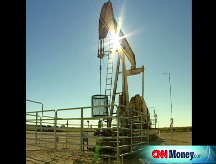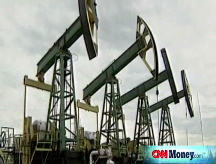Americans favor offshore drilling
Poll finds most people think drilling for oil and natural gas off the nation's coast lines is a good idea.
NEW YORK (CNNMoney.com) -- As the nation struggles to meet its energy needs, a majority of Americans think offshore drilling for oil and natural gas is a good idea, according to according to a CNN/Opinion Research Corporation poll released Wednesday.
The poll, which surveyed more than 500 adults by phone in July, found that 69% of respondents support the idea of offshore drilling, while 30% opposed it. In June, 73% were in favor of offshore drilling.
But the poll also found that Americans are divided over whether or not offshore drilling will have an immediate impact on high gas prices.
When asked if increased offshore drilling would reduce gas prices in the next year, only 51% of a separate sampling of 500 Americans believed it would, while 49% did not.
The debate over offshore drilling has become an increasingly important political issue in the era of $4 a gallon gas.
President Bush on Wednesday called on Congress to allow offshore oil drilling, citing an "urgent" need to reduce pressure on crude and gas prices.
Supporters of offshore drilling, including President Bush, say it will help the country break its dependence on foreign imports and shield the U.S. economy from volatility in the global oil market.
The bans prohibiting offshore drilling, which were put in place decades ago, are outdated and should be lifted, proponents say.
But opponents argue that more drilling offshore could damage sensitive ecosystems.
"There's a reason why those bans and moratoria were put in place," said Matt McClain, director of communications for the environmental group Surfrider Foundation. "And those risks are always there."
McClain says increased offshore drilling would "provide questionable results." He points out that the nation's coasts are not just recreational areas but are important "economic engines," especially in California and Florida where tourism is a key driver of economic activity.
What's more, the nation imports the bulk of its oil from Canada and Mexico - complicating the energy independence argument, McClain says.
Still, the nation's economy will continue to rely on fossil fuels for the foreseeable future, according to Sara Banaszak, senior economist at the American Petroleum Institute.
"Under any model of the country's energy future, we will still need more oil and gas over next 20 years," she said. Offshore drilling can help meet that need and will boost domestic economic activity.
Banaszak says opening up the country's coast lines to oil exploration has the potential to have "immediate impact," on gas prices.
Lifting the ban would send a "strong signal" to the oil futures market, which could help bring the price of crude down immediately, she said.
But it is difficult to say how much oil and natural gas may be brought to the market as a result of offshore drilling.
"We haven't been able to do any research in the moratoria areas for 20 or 30 years," Banaszak said.
In some cases, like in Florida where some offshore infrastructure already exists, installations could be brought online in 2 to 3 years, Banaszak said.
In most cases, however, it would take up to 15 years to access offshore oil, depending on how far the source is from shore and how deep below the surface it is. ![]()





